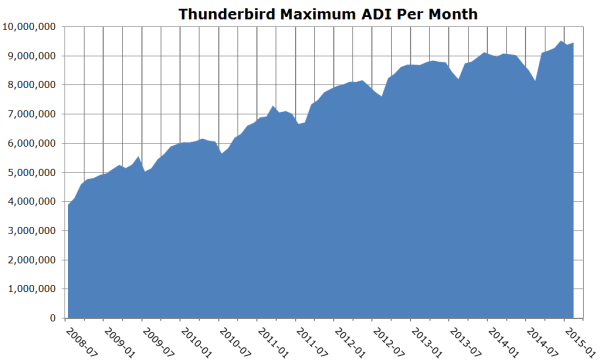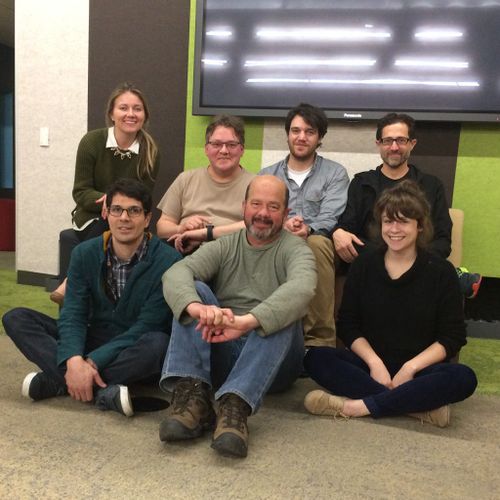Добавить любой RSS - источник (включая журнал LiveJournal) в свою ленту друзей вы можете на странице синдикации.
Исходная информация - http://planet.mozilla.org/.
Данный дневник сформирован из открытого RSS-источника по адресу http://planet.mozilla.org/rss20.xml, и дополняется в соответствии с дополнением данного источника. Он может не соответствовать содержимому оригинальной страницы. Трансляция создана автоматически по запросу читателей этой RSS ленты.
По всем вопросам о работе данного сервиса обращаться со страницы контактной информации.
[Обновить трансляцию]
The Mozilla Blog: Webmaker App Takes Fresh Approach to Digital Literacy |
Tomorrow at Mobile World Congress in Barcelona, Mozilla will release an open beta of the Webmaker app: a free, independent web publishing tool. This is an important next step in Mozilla’s effort to dramatically increase digital literacy around the world.
The Webmaker app emerged from a year of research in Bangladesh, India and Kenya. The research pointed to two things: new smartphone users face a steep learning curve, often limiting themselves to basic apps like Facebook and not even knowing they are on the Internet; and users yearn for — and can benefit greatly from — the ability to create local, relevant content.
Webmaker app is designed to address these needs by making it possible for anyone to quickly publish a website or an app from the moment they turn on their first smartphone. Students can build a digital bulletin board for their peers, teachers can create and distribute lesson plans, and merchants can produce websites to promote their products.
The idea is to get new smartphone users making things quickly when they get online — and then to help them do more sophisticated things over time. This ‘make first’ approach to digital literacy encourages people to see themselves as active creators rather than passive consumers. This mindset will be critical as billions people grapple with the question ‘how and why should I use the internet?’ for the first time over the next few years.
Webmaker app is free, open source and available in over 20 languages. Users can share their creations using a simple URL via SMS, Facebook, WhatsApp and more. Content created in Webmaker will load in any mobile web browser. The current open beta version is available for Android, Firefox OS and modern mobile browsers. A full release is planned for later this year.
Complementing the Webmaker app are Mozilla’s far-reaching, face-to-face learning programs. Our network of volunteer makers, mentors and educators operate in more than 80 countries. These volunteers — equipped with the app and other tools — run informal workshops in schools, libraries and other public places to help people understand how the Web works and create content relevant to their everyday lives. Last year alone, Mozilla volunteers ran 2,513 workshops across 450 cities.
All of these digital literacy activities are driven by partnerships. Mozilla partners with NGOs, mobile carriers and other global organizations to ensure our digital literacy programs reach individuals who need it most. We’re joining forces with influential partners who share our passion for an open Web, local content creation and empowered users.
When billions of first-time Web users come online, they will find a platform they can build, mold and use everyday to better their lives, businesses and education. It’s an ambitious order, but Mozilla is prepared. To participate, or learn more about our digital literacy initiatives, visit webmaker.org/localweb.
https://blog.mozilla.org/blog/2015/03/01/webmaker-app-takes-fresh-approach-to-digital-literacy/
|
|
Gervase Markham: Top 50 DOS Problems Solved: Doubling Disk Capacity |
Q: I have been told that it is possible to convert 720K 3.5-inch floppy disks into 1.44Mb versions by drilling a hole in the casing. Is this true? How is it done? Is it safe?
A: It is true for the majority of disks. A few fail immediately, but the only way to tell is to try it. The size and placement of the hole is, near enough, a duplicate of the write-protect hole.
If the write-protect hole is in the bottom left of the disk, the extra hole goes in a similar position in the bottom right. Whatever you do, make sure that all traces of plastic swarf are cleared away. As to whether this technique is safe, it is a point of disagreement. In theory, you could find converted disks less reliable. My own experience over several years has been 100 per cent problem free other than those disks which have refused to format to 1.44Mb in the first place.
You can perform a similar trick with 360K and 1.2Mb 5.25-inch disks.
Hands up who remembers doing this. I certainly do…
http://feedproxy.google.com/~r/HackingForChrist/~3/Dx2oJp7PNE0/
|
|
Doug Belshaw: Weeknotes 08/2015 and 09/2015 |
Last week I was in Dubai on holiday with my family thanks to the generosity of my Dad. Here’s a couple of photos from that trip. Scroll down for this week’s updates!



This (four-day) work week I’ve been:
Mozilla
- Catching up with emails and notes from team meetings.
- Creating questionnaires for the new Web Literacy Basics I modules.
- Moving GitHub tickets relating to the Webmaker Curriculum to a new repository.
- Putting together agenda and updating spreadsheet for this week’s Web Literacy Map community call.
- Reviewing Stacy Martin’s What’s Wrong With Your Password? teaching kit.
- Adding my thoughts to the design process for the upcoming Web Literacy page on teach.webmaker.org.
- Responding to Dave Crusoe’s post about the importance of webmaking in the #TeachTheWeb discussion forum.
- Editing the audio and writing an overview of this weeks’ Web Literacy Map community call.
- Filing GitHub issues (and a meta issue) for all of the Web Literacy Map v1.5 competencies. This is so we can work asynchronously on the skills underpinning those competencies.
- Travelling to London for a meeting with Michelle. This turned into a five-hour ordeal after some of the tracks broke in front of the train. Thankfully, I’d already made the decision to stay over until Saturday!
- Writing:
Dynamic Skillset
- Discussing potential involvement in a Future Classrooms event in Armagh later this month.
- Confirming my keynote and workshop for London College of Fashion‘s annual conference at the end of March.
- Thinking through the launch website to replace the current placeholder. Sign up to this low-volume email list for updates!
Other
- Planning my next articles for Educating Modern Learners and DMLcentral.
- Curating photos from our Dubai trip, which I’ll make into an iPhoto book (as we do for all of our family holidays!)
- Writing:
- Attending the London Festival of Education on Saturday. It was great to catch up with Dai Barnes, Tim Riches, Jim Knight, and Oliver Quinlan. It was also great to meet Matt Rogers and surprise Tom Bennett. Other than that I went to a session featuring George The Poet, one on mindfulness in education, and DigitalMe‘s workshop on Open Badges.
- Delighted at receiving the UK Scouting badges below. Read more on the Flickr page for this photo.
Next week I’ll be at home working more on the Learning Pathways whitepaper and Web Literacy Map v1.5. I’ll also be helping out with the Clubs curriculum work where necessary.
Finally, I’m considering doing more work I originally envisaged this year with Dynamic Skillset, so email hello@nulldynamicskillset.com if you think I can help you or your organisation!
All images by me, except header image CC BY-NC NASA’s Marshall Space Flight Center
http://dougbelshaw.com/blog/2015/02/28/weeknotes-08-09-2015/
|
|
Cameron Kaiser: The oldest computer running TenFourFox |
And Mozilla says you need an Intel Mac to run Firefox! Oh, those kidders! They're a laugh a minute!
http://tenfourfox.blogspot.com/2015/02/the-oldest-computer-running-tenfourfox.html
|
|
Yunier Jos'e Sosa V'azquez: Firefox 38 brindar'a soporte para Windows de 64 bits |
Firefox 38 -actualmente en el canal Developer Edition- ser'a la primera versi'on de Firefox con soporte para Windows de 64 bits, con este lanzamiento Mozilla completar'a el soporte a dicha arquitectura pues ya se contaba con versiones en Linux y Mac.
Anteriormente, solo de contaba con Firefox de 64 bits para Windows en el canal Nightly bajo etapa de pruebas y correcciones, ahora los usuarios de Windows podr'an utilizar una versi'on optimizada de Firefox para dicha plataforma. Firefox 38 incorpora otras novedades interesantes y m'as adelante hablaremos sobre ello.
La liberaci'on de Firefox 38 final est'a planificada para el 12 de mayo y a'un falta tiempo por definir si finalmente se contar'a con esta versi'on, esperamos que s'i. Esta edici'on la pueden descargar desde la secci'on Aurora de nuestra zona de Descargas para Linux y Windows en espa~nol.
http://firefoxmania.uci.cu/firefox-38-brindara-soporte-para-windows-de-64-bits/
|
|
Mozilla Reps Community: Rep of the month: February 2015 |
Stefania Ioana Chiorean is one of the most humble, inspiring and hard working contributor of the Reps community.
She has always been an inspiration of enthusiasm for the Mozilla community worldwide. Her proactive nature of getting things done has motivated Reps throughout. Being the part of Mozilla Romania Community, Ioana helps out anyone and everyone who wants to learn and make the web better. Spreading around Mozillian News through Social Media accounts of Mozilla Romania Community she enjoys helping the SUMO community. An emboldening persona in Womoz, Ioana encourage women participation in tech.
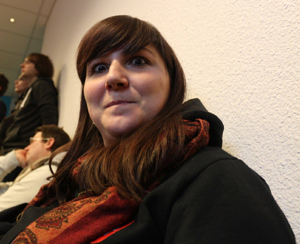
During the last few months, Ioana has been organizing and participating in several events to promote Mozilla like FOSDEM, OSOM, and also to involve more women into Free/Open Source communities and Mozilla through WoMoz initiative, highly involved in Mozilla QA helping to smash as many bugs as possible in several Mozilla products.
Ioana is now driving the Buddy Up QA Pilot program, which aims to recruit and train community members to actively own testing of this project.
Also we welcome Ioana as a Peer of the Reps Module and congratulate her for being the Rep of the Month!
Thanks Ioana for all you do for the the Reps, Mozilla and the Open Web.
Cheers little romanian vampire!
Don’t forget to congratulate her on Discourse!
https://blog.mozilla.org/mozillareps/2015/02/28/rep-of-the-month-february-2015/
|
|
Mozilla Thunderbird: Thunderbird Usage Continues to Grow |
We’re happy to report that Thunderbird usage continues to expand.
Mozilla measures program usage by Active Daily Installations (ADI), which is the number of pings that Mozilla servers receive as installations do their daily plugin block-list update. This is not the same as the number of active users, since some users don’t access their program each day, and some installations are behind firewalls. An estimate of active monthly users is typically done by multiplying the ADI by a factor of 3.
To plot changes in Thunderbird usage over time, I’ve picked the peak ADI for each month for the last few years. Here’s the result:
Germany has long been our #1 country for usage, but in 4th quarter 2014, Japan exceeded US as the #2 country. Here’s the top 10 countries, taken from the ADI count of February 24, 2015:
| Rank | Country | ADI 2015-02-24 |
| 1 | Germany | 1,711,834 |
| 2 | Japan | 1,002,877 |
| 3 | United States | 927,477 |
| 4 | France | 777,478 |
| 5 | Italy | 514,771 |
| 6 | Russian Federation | 494,645 |
| 7 | Poland | 480,496 |
| 8 | Spain | 282,008 |
| 9 | Brazil | 265,820 |
| 10 | United Kingdom | 254,381 |
| All Others | 2,543,493 | |
| Total | 9,255,280 |
Country Rankings for Thunderbird Usage, February 24, 2015
The Thunderbird team is now working hard preparing our next major release, which will be Thunderbird 38 in May 2015. We’ll be blogging more about that release in the next few weeks, including reporting on the many new features that we have added.
https://blog.mozilla.org/thunderbird/2015/02/thunderbird-usage-continues-to-grow/
|
|
Liz Henry: A useful Bugzilla trick |
At the beginning of February I changed teams within Mozilla and am now working as a release manager. It follows naturally from a lot of the work I’ve already been doing at Mozilla and I’m excited to join the team working with Lukas, Lawrence, and Sylvestre!
I just learned a cool trick for dealing with several bugzilla.mozilla.org bugs at once, on MacOS X.
1) Install Bugzilla Services.
2) Add a keyboard shortcut as Alex Keybl describes in the blog post above. (I am using Control-Command-B)
3) Install the BugzillaJS (Tweaks for Bugzilla) addon.
4) Install the Tree Style Tab addon.
Now, from any text, whether in email, a desktop text file, or anywhere in the browser, I can highlight a bunch of text and bug number will be parsed out of the text. For example, from an email this morning:
Bug 1137050 - Startup up Crash - patch should land soon, potentially risky David Major seems to think it is risky for the release. Besides that, we are going to take: Bug 1137469 - Loop exception - patch waiting for review Bug 1136855 - print preferences - patch approved Bug 1137141 - Fx account + hello - patch waiting for review Bug 1136300 - Hello + share buttons - Mike De Boer will work on a patch today And maybe a fix for the ANY query (bug 1093983) if we have one...
I highlighted the entire email and hit the “open in bugzilla” keystroke. This resulted in a Bugzilla list view for the 6 bugs mentioned in the email.
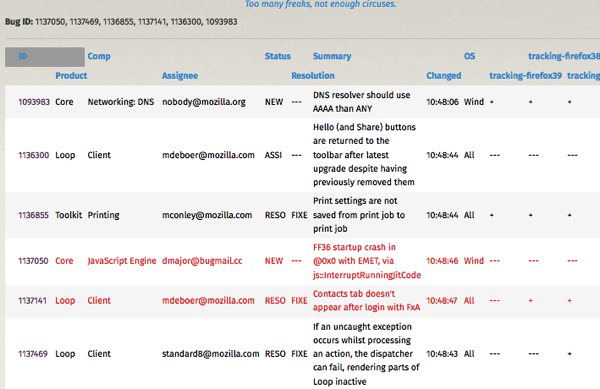
With BugzillaJS installed, I have an extra option at the bottom of the page, “Open All in Tabs”, so if I wanted to triage these bugs, I can open them all at once. The tabs show up in my sidebar, indented from their parent tab. This is handy if I want to collapse this group of tabs, or close the parent tab and all its children at once (The original list view of these 6 bugs, and each of its individual tabs.) Tree Style Tab is my new favorite thing!
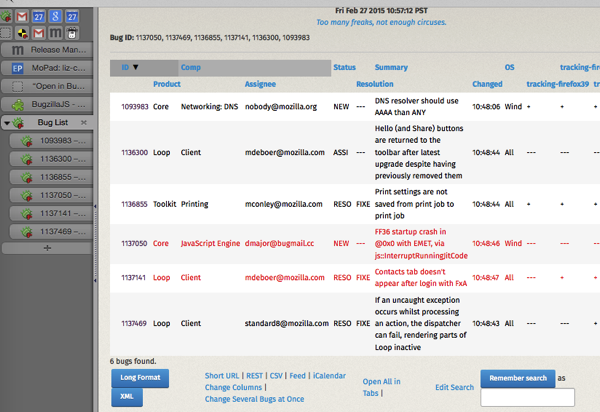
In this case, after I had read each bug from this morning and closed the tabs, my coworker Sylvestre asked me to make sure I cc-ed myself into all of them to keep an eye on them later today and over the weekend so that when fixes are checked in, I can approve them for release.
Here I did not want to open up every bug in its own tab but instead went for “Change Several Bugs at Once” which is also at the bottom of the page.
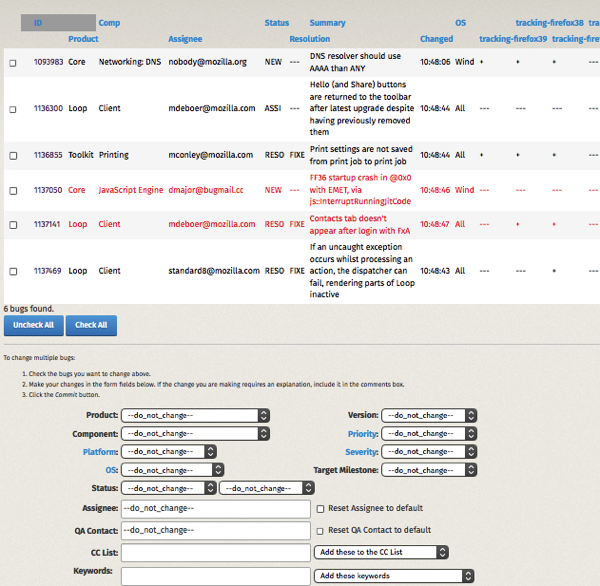
This batch edit view of bugs is a bit scarily powerful since it will result in bugmail to many people for each bug’s changes. When you need it, it’s a great feature. I added myself to the cc: field all in one swoop instead of having to click each tab open, click around several times in each bug to add myself and save and close the tab again.
It was a busy day yesterday at work but I had a nice time working from the office rather than at home. Here is the view from the SF Mozilla office 7th floor deck where I was working and eating cake in the sun. Cannot complain about life, really.

|
|
Chris AtLee: Diving into python logging |
Python has a very rich logging system. It's very easy to add structured or unstructured log output to your python code, and have it written to a file, or output to the console, or sent to syslog, or to customize the output format.
We're in the middle of re-examining how logging works in mozharness to make it easier to factor-out code and have fewer mixins.
Here are a few tips and tricks that have really helped me with python logging:
There can be only more than one
Well, there can be only one logger with a given name. There is a special
"root" logger with no name. Multiple
getLogger(name) calls with the same name will return the same logger
object. This is an important property because it means you don't need to
explicitly pass logger objects around in your code. You can retrieve them
by name if you wish. The logging module is maintaining a global registry of
logging objects.
You can have multiple loggers active, each specific to its own module or even class or instance.
Each logger has a name, typically the name of the module it's being used from. A common pattern you see in python modules is this:
# in module foo.py import logging log = logging.getLogger(__name__)
This works because inside foo.py, __name__ is equal to "foo". So inside
this module the log object is specific to this module.
Loggers are hierarchical
The names of the loggers form their own namespace, with "." separating
levels. This means that if you have have loggers called foo.bar, and foo.baz,
you can do things on logger foo that will impact both of the children. In
particular, you can set the logging level of foo to show or ignore debug
messages for both submodules.
# Let's enable all the debug logging for all the foo modules import logging logging.getLogger('foo').setLevel(logging.DEBUG)
Log messages are like events that flow up through the hierarchy
Let's say we have a module foo.bar:
import logging log = logging.getLogger(__name__) # __name__ is "foo.bar" here def make_widget(): log.debug("made a widget!")
When we call make_widget(), the code generates a debug log message. Each
logger in the hierarchy has a chance to output something for the message,
ignore it, or pass the message along to its parent.
The default
configuration for loggers is to have their levels unset (or set to NOTSET). This means the logger will just pass the message on up to its parent. Rinse & repeat until you get up to the root logger.
So if the foo.bar logger hasn't specified a level, the message will
continue up to the foo logger. If the foo logger hasn't specified a
level, the message will continue up to the root logger.
This is why you typically configure the logging output on the root logger;
it typically gets ALL THE MESSAGES!!! Because this is so common, there's a
dedicated method for configuring the root logger:
logging.basicConfig()
This also allows us to use mixed levels of log output depending on where the message are coming from:
import logging # Enable debug logging for all the foo modules logging.getLogger("foo").setLevel(logging.DEBUG) # Configure the root logger to log only INFO calls, and output to the console # (the default) logging.basicConfig(level=logging.INFO) # This will output the debug message logging.getLogger("foo.bar").debug("ohai!")
If you comment out the setLevel(logging.DEBUG) call, you won't see the
message at all.
exc_info is teh awesome
All the built-in logging calls support a keyword called exc_info, which
if isn't false, causes the current exception information to be logged in
addition to the log message.
e.g.:
import logging logging.basicConfig(level=logging.INFO) log = logging.getLogger(__name__) try: assert False except AssertionError: log.info("surprise! got an exception!", exc_info=True)
There's a special case for this, log.exception(), which is equivalent to
log.error(..., exc_info=True)
Python 3.2 introduced a new keyword, stack_info, which will output the
current stack to the current code. Very handy to figure out how you got
to a certain point in the code, even if no exceptions have occurred!
"No handlers found..."
You've probably come across this message, especially when working with 3rd party modules. What this means is that you don't have any logging handlers configured, and something is trying to log a message. The message has gone all the way up the logging hierarchy and fallen off the...top of the chain (maybe I need a better metaphor).
import logging log = logging.getLogger() log.error("no log for you!")
outputs:
No handlers could be found for logger "root"
There are two things that can be done here:
-
Configure logging in your module with
basicConfig()or similar -
Library authors should add a NullHandler at the root of their module to prevent this. See the cookbook and this blog for more details here.
Want more?
I really recommend that you read the logging documentation and cookbook which have a lot more great information (and are also very well written!) There's a lot more you can do, with custom log handlers, different output formats, outputting to many locations at once, etc. Have fun!
|
|
Rizky Ariestiyansyah: MozKopDarJKT February 2015 Photo |
Gallery of #MozKopDarJKT
|
|
Blake Winton: A long time ago, on a computer far far away… |
Six years ago, I started contributing to Mozilla.
Read more… (3 min remaining to read)
https://weblog.latte.ca/blake/employment/mozilla/sixyears.html
|
|
Air Mozilla: Webmaker Demos February 27 2015 |
 Webmaker Demos February 20 2015
Webmaker Demos February 20 2015
|
|
Mike Conley: The Joy of Coding (Episode 3) |
The third episode is up! My machine was a little sluggish this time, since I had OBS chugging in the background attempting to do a hi-res screen recording simultaneously.
Richard Milewski and I are going to try an experiment where I try to stream with OBS next week, which should result in a much higher-resolution stream. We’re also thinking about having recording occur on a separate machine, so that it doesn’t bog me down while I’m working. Hopefully we’ll have that set up for next week.
So this third episode was pretty interesting. Probably the most interesting part was when I discovered in the last quarter that I’d accidentally shipped a regression in Firefox 36. Luckily, I’ve got a patch that fixes the problem that has been approved for uplift to Aurora and Beta. A point release is also planned for 36, so I’ve got approval to get the fix in there too. \o/
Here are the notes for the bug I was working on. The review feedback from karlt is in this bug, since I kinda screwed up where I posted the review request with MozReview.
http://mikeconley.ca/blog/2015/02/27/the-joy-of-coding-episode-3/
|
|
Doug Belshaw: The final push for Web Literacy Map v1.5 (and how you can get involved!) |
By the end of March 2015 we should have a new, localised iteration of Mozilla’s Web Literacy Map. We’re calling this ‘version 1.5’ and it’s important to note that this is a point release rather than a major new version.

Right now we’re at the point where we’ve locked down the competencies and are now diving into the skills underpinning those competencies. To help, we’ve got a epic spreadsheet with a couple of tabs:

The REVIEW tab contains lots of comments about the suitability of the skills for v1.5. On this week’s community call we copied those skills that had no comments about them to the REFINE tab:

This is where we need your help. We’ve got skills in the REVIEW tab that, with some tweaking, can help round out those skills we’ve already transferred. It would be great if you could help us discuss and debate those. There’s also some new competencies that have no skills defined at present.
We’ve got weekly community calls where we work on this stuff, but not everyone can make these. That’s why we’re using GitHub issues to discuss and debate the skills asychronously.
Here’s how to get involved:
- Make sure you’ve got a (free) GitHub account
- Head to the meta-issue for all of the work we’re doing around v1.5 skills
- Have a look through the skills under the various competencies (e.g. Remixing)
- Suggest an addition, add a question, or point out overlaps
- Get email updates when people reply - and then continue the conversation!
We really do need as many eyes as possible on this. No matter whether you’re an old hand or a complete n00b, you’re welcome. The community is very inviting and tolerant, so please dive in!
Comments? Questions? These would be better in GitHub, but if you want to get in touch directly I’m @dajbelshaw on Twitter or you can email me: doug@mozillafoundation.org
|
|
Mozilla Reps Community: Reps Weekly Call – February 26th 2015 |
Last Thursday we had our weekly call about the Reps program, where we talk about what’s going on in the program and what Reps have been doing during the last week.

Summary
- RepsIDMeetup
- Alumni status and leaving SOP
- New mentors coming soon
- GMRT event Pune
- Teach The Web Talks
- FOSS Asia
- BuddyUp
- Say Hello Day
AirMozilla video
Don’t forget to comment about this call on Discourse and we hope to see you next week!
https://blog.mozilla.org/mozillareps/2015/02/27/reps-weekly-call-february-26th-2015/
|
|
Kaustav Das Modak: Firefox OS for everyone |
|
|
Pierros Papadeas: FOSDEM 2015 Bug sprint tool |
“Reclama” Experiment report
Intro
FOSDEM 2015 is a premier open source developers’ event in Europe. Mozilla is heavily participating in the event for over 10 years now, with booths and dev-rooms. This year the Community Development team decided to run an experimental approach on recruiting new contributors by promoting good-first bugs.
Scope
Given the highly technical nature of the audience in FOSDEM 2015, the approach decided has a straight-forward promotion of bugs and prizes for them, for people to track and get involved.
Following sign-off meeting with the stakeholders (William Quiviger, Francisco Piccolini and Brian King) the specifications agreed for the first iteration of the experiment were as follows:
- A straight-forward interface displaying hand-selected good first bugs, ready to be worked on
- Next to bugs, prizes should be displayed.
- Viewing from mobile devices should be also accounted for.
- Public access to all content. Ability to edit and add events on selected accounts (hardcoded for v1)
- The interface has to be properly Mozilla branded (high visibility and promotion in an event)
- It needs to be future-proof for event to come (easily add new events and/or bugs after deployment)
- Solution URL should be short and easily memorable and digestible.
- It needs to be delivered before the start of FOSDEM 2015

- A report should be compiled with usage statistics and impact analysis for the experiment
Development
Given the extremely short timeframe (less than 3 days), ready, quick or off-the-shelf solutions were evaluated like:
- An online spreadsheet (gdocs)
- Not meeting requirements #3, #5, #6, #7
- A bugzilla query
- Not meeting requirements #2, #7, #6
- A scrappy HTML plain coded solution
- Not meeting requirements #4, #6
Thus, given the expertise of the group it was decided to create a django application to meet all requirements in time.
Following 2 days of non-stop development (fantastic work from Nikos and Nemo!), testing and iteration we met all requirements by developing the app which is codenamed “reclama” (Italian -shortof- for claim).
Code can be found here: https://github.com/mozilla/reclama
 Deployment
Deployment
In order to meet requirement #7 (short and memorable URL) and given the timeframe, we decided to acquire a URL quickly ( mozbugsprints.org ) and deploy the application.
For usage statistics, awstats was deployed on top of the app to track incoming traffic.
Usage statistics
During the weekend of FOSDEM 2015, 500 people with almost 5000 hits visited the website. That’s almost 10% of the event participants.
Saturday 31-Jan-2015 traffic analysis
 Booths and promotion of the experiment started at 9:00 as expected. With mid-day (noon) pick which is consistent with increased traffic in booths area of the event.
Booths and promotion of the experiment started at 9:00 as expected. With mid-day (noon) pick which is consistent with increased traffic in booths area of the event.
Traffic continues to flow in steadily even after the end of the event, which indicates that people keep the URL and interact with our experiment substantial time after the face to face interaction with our booth. Browsing continues through the night, and help might be needed (on call people/mentors ?) during that too.
Sunday 1-Feb-2015 traffic analysis
 Second day in FOSDEM 2015 included a Mozilla dedicated dev-room. The assumption that promotion through the dev-room would increase the traffic in our experiment proved to be false, as the traffic continued on the same levels for day 2.
Second day in FOSDEM 2015 included a Mozilla dedicated dev-room. The assumption that promotion through the dev-room would increase the traffic in our experiment proved to be false, as the traffic continued on the same levels for day 2.
As expected there was a sharp cut-off after 16:00 (when the final keynote starts) and also people seem to not come back after the event. Thus the importance of hyper-specific event-focused (and branded) challenge seems to be high, as people relate to that understanding the one-off nature of it.
Impact
32 coding bugs from different product areas were presented to people. 9 of them were edited (assigned, commented, worked on) during or immediately (one day) after FOSDEM 2015. Out of those 9 , 4 ended up on first patch submission (new contributors) and 3 received no response (blocked contributor) from mozilla staff (or core contributors).
Recommendations
- Re-do experiment in a different cultural environment, but still with related audience, so we can cross-compare.
- Continue the experiment by implementing new functionality as suggested by the stakeholders (notes, descriptions etc).
- Experiment random sorting of bugs, as current order seemed to affect what has been worked on.
- Submission of bugs to be featured on an event should be coordinated by event owner and related to event theme and topics.
- A/B test how prize allocation affects what bugs are worked on.
- Expand promotional opportunities throughout the event. (booth ideas?)
- On call developers on promoted bugs would eliminate the non-answered section of our bugs
PS. Special thanks to Elio for crafting an excellent visual identity and logo once again!
|
|
Gervase Markham: An Encounter with Ransomware |
An organization which I am associated with (not Mozilla) recently had its network infected with the CryptoWall 3.0 ransomware, and I thought people might be interested in my experience with it.
The vector of infection is unknown but once the software ran, it encrypted most data files (chosen by extension) on the local hard drive and all accessible shares, left little notes everywhere explaining how to get the private key, and deleted itself. The notes were placed in each directory where files were encrypted, as HTML, TXT, PNG and as a URL file which takes you directly to their website.
Their website is accessible as either a TOR hidden service or over plain HTTP – both options are given. Presumably plain HTTP is for ease for less technical victims; Tor is for if their DNS registrations get attacked. However, as of today, that hasn’t happened – the site is still accessible either way (although it was down for a while earlier in the week). Access is protected by a CAPTCHA, presumably to prevent people writing automated tools that work against it. It’s even localised into 5 languages.
The price for the private key was US$500. (I wonder if they set that based on GeoIP?) However, as soon as I accessed the custom URL, it started a 7-day clock, after which the price doubled to US$1000. Just like parking tickets, they incentivise you to pay up quickly, because argument and delay will just make it cost more. If you haven’t paid after a month, they delete your secret key and personal page.
While what these thieves do is illegal, immoral and sinful, they do run a very professional operation. The website had the following features:
- A “decrypt one file” button, which allows them to prove they have the private key and re-establish trust. It is, of course, also protected by a CAPTCHA. (I didn’t investigate to see whether it was also protected by numerical limits.)
- A “support” button, which allows you to send a message to the thieves in case you are having technical difficulties with payment or decryption.
The organization’s last backup was a point-in-time snapshot from July 2014. “Better backups” had been on the ToDo list for a while, but never made it to the top. After discussion with the organization, we decided that recreating the data would have taken much more time than the value of the ransom, and so were were going to pay. I tried out the “Decrypt One File” function and it worked, so I had some confidence that they were able to provide what they said they were.
I created a wallet at blockchain.info, and used an exchange to buy exactly the right amount of Bitcoin. (The first exchange I tried had a ‘no ransomware’ policy, so I had to go elsewhere.) However, when I then went to pay, I discovered that there was a 0.0001BTC transaction fee, so I didn’t have enough to pay them the full amount! I was concerned that they had automated validation and might not release the key if the amount was even a tiny bit short. So, I had to go on IRC and talk to friends to blag a tiny fraction of Bitcoin in order to afford the transfer fee.
I made the payment, and pasted the transaction ID into the form on the ransomware site. It registered the ID and set status to “pending”. Ten or twenty minutes later, once the blockchain had moved on, it accepted the transaction and gave me a download link.
While others had suggested that there was no guarantee that we’d actually get the private key, it made sense to me. After all, word gets around – if they don’t provide the keys, people will stop paying. They have a strong incentive to provide good ‘customer’ service.
The download was a ZIP file containing a simple Windows GUI app which was a recursive decryptor, plus text files containing the public key and the private key. The app worked exactly as advertised and, after some time, we were able to decrypt all of the encrypted files. We are now putting in place a better backup solution, and better network security.
A friend who is a Bitcoin expert did do a little “following the money”, although we think it went into a mixer fairly quickly. However, before it did so, it was aggregated into an account with $80,000+ in it, so it seems that this little enterprise is fairly lucrative.
So, 10/10 for customer service, 0/10 for morality.
The last thing I did was send them a little message via the “Support” function of their website, in both English and Russian:
Such are the ways of everyone who is greedy for unjust gain; it takes away the life of its possessors.
Таковы пути всех, кто жаждет преступной добычи; она отнимает жизнь у завладевших ею.
‘The time has come,’ Jesus said. ‘The kingdom of God has come near. Repent and believe the good news!’
– Пришло время, – говорил Он, – Божье Царство уже близко! Покайтесь и верьте в Радостную Весть!
http://feedproxy.google.com/~r/HackingForChrist/~3/Wo80z7zGeOk/
|
|
Mozilla Reps Community: Impact teams: a new approach for functional impact at Reps |
When the new participation plan was forming one of the first questions was: how can the Reps program enable more and deeper participation in Mozilla? We know that Reps are empowering local and regional communities and have been playing an important role in various project like Firefox OS launches, but there wasn’t an organized and more importantly scalable way to provide support to functional teams at Mozilla. The early attempts of the program to help connect volunteers with functional areas were the Special Interest Groups (SIG). Although in some cases and for some periods of time the SIGs worked very well and were impactful, they wasn’t sustainable in the long run. We couldn’t provide a structure that ensured mutual benefit and commitment.
With the renewed focus on participation we’re trying to think differently about the way that Reps can connect to functional teams, align with their goals and participate in every part of Mozilla. And this is where the “Impact teams” come in. Instead of forming loose interest groups, we want to form teams that work well together and are defined by the impact they are having, as well as excited by future opportunity to not only have deeper participation but personal growth as part of a dedicated team where colleagues include project staff.
The idea of these new impact teams is to make sure that the virtuous circle of mutual benefit is created. This means that we will work with functional teams to ensure that we find participation opportunities for volunteers that have direct impact on project goals, but at the same time we make sure that the volunteers will benefit from participating, widening their skills, learning new ones.
These teams will crystallize through the work on concrete projects, generating immediate impact for the team, but also furthering the skills of volunteers. That will allow the impact team to take on bigger challenges with time: both volunteers and functional teams will learn to collaborate and volunteers with new skills will be able to take the lead and mentor others.
We’re of course at the beginning and many questions are still open. How can we organize this in an agile way? How can we make this scalable? Will the scope of the role of Reps change if they are more integrated in functional activities? How can we make sure that all Mozillians, Reps and non Reps are part of the teams? Will we have functional mentors? And we think the only way to answer those questions is to start trying. That’s why we’re talking to different functional areas, trying to find new participation opportunities that provide value for volunteers. We want to learn by doing, being agile and adjusting as we learn.
The impact teams are therefore not set in stone, we’re working with different teams, trying loose structures and specially putting our energy into making this really beneficial for both functional teams and volunteers. Currently we are working to the Marketplace team, the Firefox OS Market research team and the developer relations team. And we’ll be soon reaching out to Mozillians and Reps who have a track record in those areas to ask them to help us build these impact teams.
We’re just at the beginning of a lot of pilots, tests, prototypes. But we’re excited to start moving fast and learn! We have plenty of work to do and many questions to answer, join us in shaping these new impact teams. Specially help us now how your participation at Mozilla can benefit your life, make you grow, learn, develop yourself. Emma Irwin is working on making education a centerpiece of participation, but do you have any other ideas? Share them with us!
|
|
Tantek Celik: #IndieWeb: Homebrew Website Club 2015-02-25 Summary |
At last night's Homebrew Website Club we discussed, shared experiences, and how-tos about realtime indie readers, changing/choosing your webhost, indie RSVPs, moving from Blogger/Tumblr to your own site, new IndieWebCamp Slack channel, and ifthisthen.cat.
See kevinmarks.com/hwc2015-02-25.html for the writeup.
http://tantek.com/2015/057/b2/indieweb-homebrew-website-club-summary
|
|








